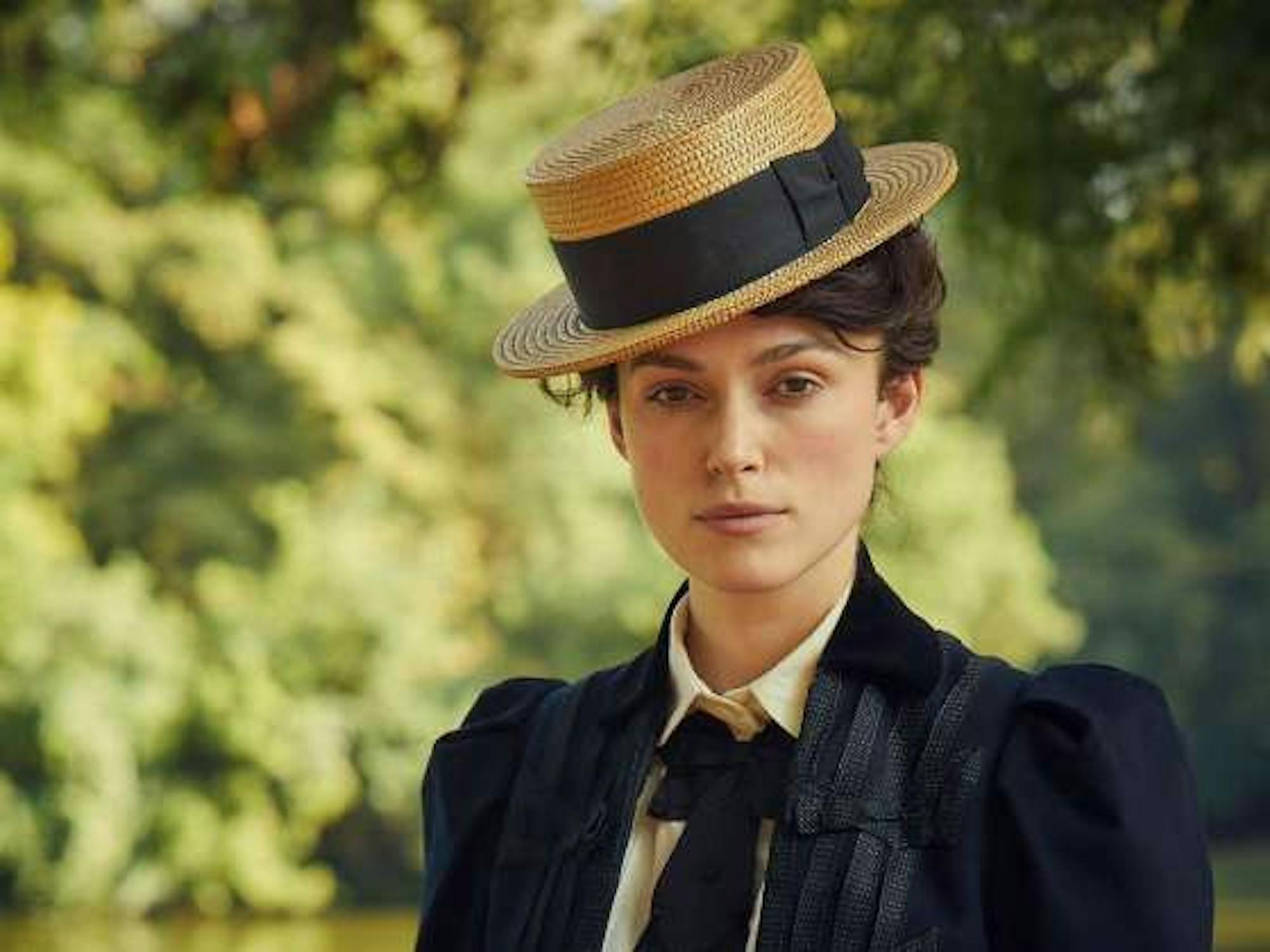On Saturday, the Museum of Fine Arts, Boston (MFA) hosted a screening of “Colette” (2018) as part of its “Gender Bending Fashion on Film” program. “Colette” is a biographical narrative of the early relationships and authorship of the late 19th and early 20th century French novelist and artist Sidonie-Gabrielle Colette. Directed by British independent film director Wash Westmoreland, the film stars Keira Knightley as the titular character, along with Dominic West, Eleanor Tomlinson and Denise Gough in other leading roles. The film premiered at the 2018 Sundance Film Festival.
Having grown up in a small village in Burgundy, France, Colette is introduced to the high-end Parisian literary circle after she marries a man pen-named Willy (Dominic West), a “literary entrepreneur,” as he calls himself, who owns a writing workshop that publishes works of ghostwriters under his pen name. The lack of recognition that Colette feels in her marriage to Willy as well as her exploration of her fluid sexual orientation leads Colette to redefine the boundaries of femininity.
Colette’s teenage bravery in pursuing her affections and displaying her dislikes foreshadows her metamorphosis into an independent woman later in life. An early scene in the film depicts Willy’s visit to the young Colette and her parents. After Willy departs for his train, Colette tells her mother that she wants to go for a walk, which actually leads her to reunite with Willy in a barn. The two intimately enjoy themselves in a haystack before Willy leaves. Colette’s secret barn trip reveals her as a forward and crude adolescent who embraces her heart’s desires, as well as a free-spirited risk-taker who is unafraid of challenging social authorities. Colette is also unafraid of displaying her dislikes. Right before her debut at the bourgeois Parisian literary social scene as Willy’s wife, Colette takes off an expensive dinner dress that Willy buys her, and changes back into her usual country outfit. To the surprised Willy, Colette explains that she cannot breathe in his high-end gift. Growing up in her pastoral home, Colette’s decision is likely the result of a country girl’s innocent disregard of the social norms of the cosmopolitan upper class than of a political statement about social class or gender. However, Colette’s natural ability to recognize and appreciate her personal needs as such ultimately allow her to pursue independence.
Colette’s feminist identity is best represented by her symbolic abandonment of her childhood name and clothing choice of the conventionally male-exclusive suit. When Willy’s workshop struggles financially to pay its ghostwriters, Colette starts writing there, and publishes a best-selling novel series about the coming of age of a young girl named Claudine under the pen name of Willy. Colette’s fury accumulates as Willy continuously rejects her request to have her next Claudine novel published under both her name and Willy’s. Her outrage peaks when Colette finds that Willy has sold the copyright to the lucrative Claudine series to their publisher without Colette’s notice. Colette confronts Willy in his office while wearing a black business suit, a choice of clothing that sharply contrasts with her last “role-play” in the film: her dress-up as Claudine largely for the entertainment of Willy. By stepping into a suit, a symbol of corporate membership, Colette defines herself as worthy of professional recognition. In her passionate final conversation with Willy, Colette says that Willy had found her when she knew nothing, and molded her to his own desires. That Colette has outgrown her innocent younger self is illustrated in her decisively storming to the door after talking with Willy. She then disregards Willy calling for her to stay with “Gabrielle,” Colette’s first name, which she had gone by until she adopted “Colette,” her last name, as her pen as well as everyday name. Colette’s refusal to respond to being called “Gabrielle” is symbolic of her detachment from her vulnerable younger self.
Femininity is again reimagined to reach beyond social conventions in Colette’s relationship with Missy and their pantomime performances. Colette started an affair with Missy, a French noblewoman, before she separates with Willy, who simultaneously is having an affair with another woman. Missy and Colette join the cast of a pantomime called Rêve d'Égypte, in which their characters share a kiss on stage. Missy and Colette break social ground not only by embodying their queer identities but also by speaking for those who are afraid of doing the same. In an interview, Denise Gough, the actress who plays Missy, speaks of art as “hugely important” at pushing boundaries by empowering the socially vulnerable as an object of empathy.
“These stories, we have to be showing them, to kids, to young people, so that they can see that they are represented. What [Colette and Missy] did that one night at that place, even if there was only one audience that saw herself or himself reflected, it’s amazing," she said.
Colette’s coming of age was synchronized with the emergence of other intelligent literary female minds, such as the Brontë sisters, Jane Austen and Emily Dickinson. These women literally fueled the growth of the female voice. The agency of expression is crucial to gaining any kind of social right, because, as the film “Colette” puts it, “the hand that holds the pen writes history.”
In the upcoming weeks, the “Gender Bending Fashion on Film” program will continue to host screenings, including “Black Panther” (2018), “Orlando” (1992), “The Man Who Fell to Earth” (1976), and “Purple Rain” (1984).
'Colette': The Hand that Holds the Pen

A still from 'Colette' (2018) is pictured.
Summary
4 Stars





